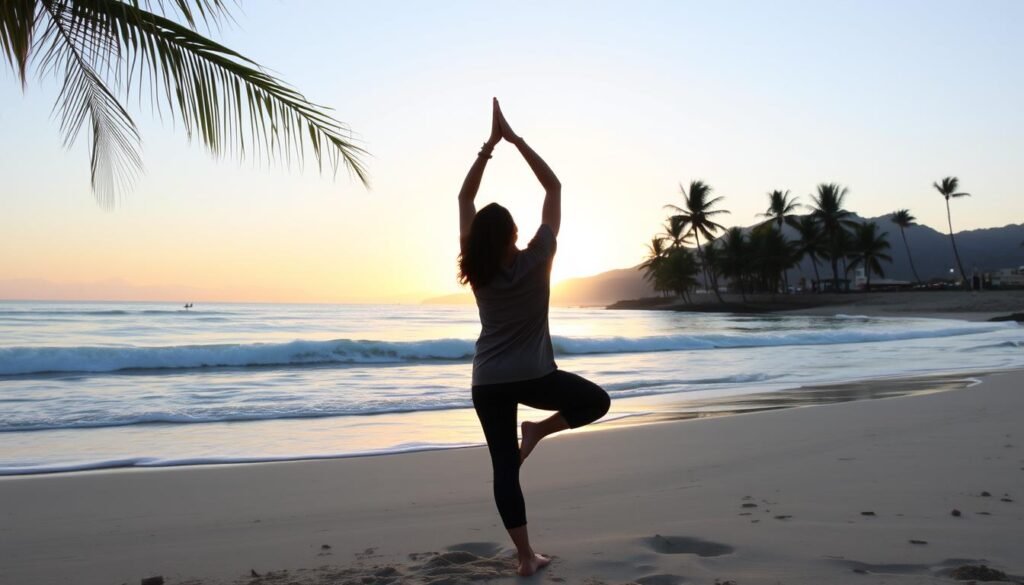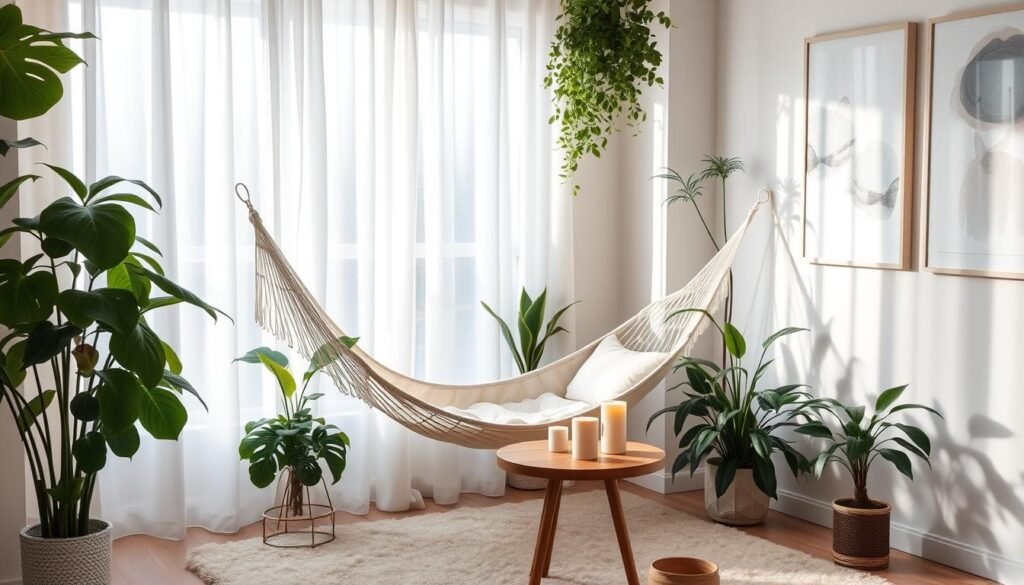
Table of Contents
ToggleThe latest Relaxing Tips straight to your inbox!
Join 30,000+ subscribers for exclusive access to our Relaxing tips!
In today’s fast world, we often wonder how to relax. Relaxation is key for our health, helping us think better and enjoy life. To relax, we need to know about relaxation techniques and stress relief.
Relaxation lets us focus on now, not past or future worries. Techniques like deep breathing and meditation help calm our minds. By using these methods daily, we can boost our mental health.
We’ll explore how to relax using deep breathing, meditation, and mindfulness. We’ll also talk about creating a calm space and setting boundaries. By the end, you’ll know how to find mental peace and improve your well-being.
Key Takeaways
- Relaxation is essential for both physical and mental well-being.
- Learning how to turn brain off and relax can improve our mental health and reduce stress.
- Relaxation techniques, such as deep breathing exercises and meditation, can help calm our minds.
- Creating a relaxation-friendly environment and setting healthy boundaries are key for mental peace.
- Regular practice of relaxation techniques can lead to improved emotional well-being and reduced anxiety.
- Incorporating stress relief methods into our daily routine can enhance our overall happiness and productivity.
- Maintaining a structured daily routine can help individuals working from home or facing periods of low motivation.
Understanding Why Your Brain Won’t “Switch Off”
We often struggle to relax our minds, thanks to today’s fast pace. Stress, mental health issues, and substances can play a part. It’s key to grasp the science behind an overactive mind and identify common causes of mental restlessness.
Practicing mindfulness and stress relief can calm our minds. Adding mental relaxation tips to our daily life can lower anxiety. Calming the mind and doing relaxation exercises can also help quiet racing thoughts and lead to rest.
Effective ways to calm the mind include setting ‘worry time’ and keeping a gratitude journal. Noting three to five positive things each night can help sleep better and reduce stress. Also, sticking to a sleep schedule and enjoying calming activities like walking or hobbies can lessen anxiety and bring mental peace.
By understanding why our minds are overactive and using mindfulness and stress relief daily, we can relax better. Remember, taking care of our mental health is vital. Small changes in our habits can lead to a more peaceful life.
Quick Techniques for Immediate Mental Relief
At times, we need a quick way to calm our minds and relax. Luckily, there are many techniques to help us find peace and quiet our minds. One great method is relaxation meditation, which you can do anywhere, anytime.
Techniques like deep breathing, progressive muscle relaxation, and mindfulness can also help. They can make our minds quieter and lower stress and anxiety. For instance, deep breathing exercises can cut anxiety by 31%, studies show. Mindfulness can also reduce stress by up to 40% in eight weeks.
Here are some quick ways to calm your mind:
- Practice relaxation meditation to calm your mind and reduce stress
- Try progressive muscle relaxation to decrease anxiety levels
- Engage in deep breathing exercises to quiet the mind and reduce stress
- Use visualization techniques to enhance relaxation and contribute to a more profound sense of calm

By adding these techniques to our daily lives, we can become more peaceful and improve our well-being. Remember, these relaxation methods are easy to do alone and are often free or low-cost. This makes them available to everyone.
The Power of Breathing Exercises
Relaxation exercises and techniques are key for mental calm and stress relief. Breathing exercises are a powerful way to soothe the mind and body. They can be done anywhere, anytime, and are a big part of mindfulness.
Studies show that deep breathing can help with health issues like eating disorders and high blood pressure. It’s suggested to practice deep breathing for 5 to 10 minutes, 3 to 4 times a day.
Box Breathing Method
The box breathing method is simple. Breathe in for 4 counts, hold for 4 counts, breathe out for 4 counts, and hold again for 4 counts. This method can lower stress and anxiety, helping you relax.
4-7-8 Breathing Technique
The 4-7-8 technique is a bit different. Breathe in through your nose for 4 counts, hold for 7 counts, and then breathe out through your mouth for 8 counts. It can slow your heart rate and help you relax.
Adding these breathing exercises to your daily routine can bring many benefits. You’ll see lower stress levels, clearer thinking, and better overall health. As you practice these techniques, you’ll become more mindful and better at handling stress and anxiety.
Physical Activities That Help Turn Your Brain Off and Relax
Doing physical activities is a great way to calm the mind and lower stress. Stephanie Booth says yoga and walking are very helpful. These activities fit any fitness level, making them easy for everyone to do.
Here are some physical activities that help with stress relief methods and mental relaxation tips:
- Yoga: mixes physical movement with mindfulness practices to help relax
- Walking: a simple activity that can be done anywhere and helps calm the mind
- Dancing: boosts heart rate and releases endorphins, improving mood and reducing anxiety
Regular physical activity can cut stress and anxiety by 20%-30%. It’s key to pick an activity you like and make it part of your daily plan. As we look into relaxation exercises and mindfulness practices, remember that moving your body is vital for your well-being.

Mindfulness Practices for Mental Clarity
Mindfulness practices can greatly help in achieving mental relaxation and reducing stress. By adding these techniques to our daily routine, we can calm our minds and boost our well-being. Meditation and deep breathing are key relaxation techniques that help in stress relief.
Regular mindfulness practice can improve emotional control, focus, and relationships. It leads to better mental health. It’s suggested to practice mindfulness every day, even for just a few minutes, to feel its benefits. These include calming the mind and promoting mental relaxation.
Basic Mindfulness Exercises
Basic mindfulness exercises focus on the present moment, often through breathing or body awareness. These exercises can be done anywhere. They’re a great way to start practicing mindfulness for stress relief and mental relaxation.
Body Scan Meditation
Body scan meditation involves lying down or sitting comfortably and focusing on different body parts. This technique helps calm the mind and promotes relaxation.
Mindful Walking Techniques
Mindful walking means paying attention to each step, the movement of the legs, and the breath rhythm. It’s a fantastic way to practice mindfulness while staying active. It’s an effective relaxation technique for stress relief and mental relaxation.
Creating a Relaxation-Friendly Environment
Our environment greatly affects our mental health. Making a few changes can help a lot. Relaxation exercises and relaxation techniques work better in calm spaces. Start by cutting down on noise and adding more natural light.
Here are some ways to make your space more relaxing:
- Choose calming colors for mental relaxation
- Keep your space tidy to lower stress and anxiety
- Make a quiet, comfy area for mindfulness practices
By following these tips, you can make a space that helps you relax and feel better. Taking care of your mental health is key. A peaceful space is a great place to begin.

Digital Detox: Unplugging for Mental Peace
Embracing digital detox can be a powerful tool for achieving mental peace and relaxation. We can start by setting healthy digital boundaries. This means turning off notifications or setting aside device-free times. This simple act can help reduce stress levels and create space for mindfulness practices.
It allows us to focus on mental relaxation tips and calming the mind.
A study found that students who completed a social media detox reported positive changes. They saw improvements in their mood, sleep, and anxiety levels. Women who quit Instagram also reported higher life satisfaction and more positive effects than those who continued using it.
By incorporating stress relief methods and relaxation exercises into our daily routine, we can experience these benefits firsthand.
- Reduced stress levels, with reports of a decrease ranging from 22% to 40% after taking breaks from screens
- Improved mental clarity and focus, with studies indicating that engaging in a digital detox for as little as 30 minutes can significantly enhance these benefits
- Increased life satisfaction, with research published in the International Journal of Environmental Research and Public Health finding a 27% increase in overall life satisfaction for individuals who limited their screen time to less than 2 hours a day
Setting Healthy Digital Boundaries
To achieve these benefits, we can start by setting healthy digital boundaries. This means maintaining tech-free zones in our homes or turning off notifications during certain times of the day. By doing so, we can create space for mindfulness practices and relaxation exercises.
Ultimately, this leads to a more peaceful and relaxed state of mind.
Natural Remedies and Supplements for Relaxation
Many of us look for natural ways to relax our minds and lower stress. Herbal teas like chamomile and lavender are great for this. They help calm anxiety and promote mental peace.
Essential oils also help with stress and mindfulness. Oils like lavender and valerian can reduce anxiety. They work well with deep breathing and meditation to calm the mind.
Some key natural remedies and supplements for relaxation include:
- Herbal teas, such as chamomile and lavender
- Essential oils, such as lavender and valerian
- Dietary changes, such as increasing anti-inflammatory foods
- Supplements, such as passionflower and valerian root
Adding these natural remedies and supplements to our daily life can help us relax. It reduces stress and improves our mental health. This leads to a calmer and more peaceful mind.
| Remedy | Benefits |
|---|---|
| Chamomile tea | Reduces anxiety symptoms, promotes relaxation |
| Lavender oil | Calms the mind, reduces stress and anxiety |
| Passionflower supplement | Treats anxiety symptoms, promotes relaxation |
Cognitive Behavioral Techniques for Racing Thoughts
Racing thoughts can be a sign of anxiety or bipolar disorder. Cognitive behavioral techniques are great for handling these thoughts. They help us spot and change negative thinking patterns to more positive ones.
Deep breathing, progressive muscle relaxation, and mindfulness meditation are good relaxation exercises. They help lower stress relief and improve mental relaxation. Adding mindfulness practices to our day can help control racing thoughts and boost our mental health.
Regular exercise also helps with anxiety and depression, which can cause racing thoughts. The CDC suggests 150 minutes of moderate exercise weekly. This can be brisk walking, cycling, or swimming. Mixing exercise with relaxation exercises and mindfulness practices can help manage racing thoughts and support mental health.
Establishing a Relaxation Routine
Exploring relaxation means finding a routine that fits us. This might include mindfulness practices like meditation and deep breathing. These stress relief methods help us handle stress and anxiety better.
Studies show that mental relaxation tips like progressive muscle relaxation and guided imagery can lower stress. Also, calming the mind with autogenic training and biofeedback-assisted relaxation boosts our well-being.
Morning Relaxation Practices
Starting the day with relaxation sets a good mood. This can be:
- 10-15 minutes of mindfulness meditation
- Deep breathing to calm the mind
- Light physical activity, like yoga or stretching, to reduce stress
Evening Wind-Down Rituals
Ending the day with relaxation helps prepare for sleep. This can be:
- Reading or listening to calming music for relaxation exercises
- Gentle stretches or yoga to release tension
- Staying away from screens to avoid stimulation
Adding these routines to our daily lives boosts our well-being and lowers stress. Start small, be consistent, and explore different stress relief methods to find what works for you.
| Relaxation Technique | Benefits |
|---|---|
| Mindfulness Meditation | Reduces stress and anxiety, improves focus |
| Deep Breathing Exercises | Lowers blood pressure, calms the mind |
| Yoga and Stretching | Reduces tension, improves flexibility |
Professional Help and When to Seek It
Sometimes, we might need more help to relax and manage stress, even with the best techniques. That’s when professional help becomes important. It offers tailored therapies for each person’s needs.
Finding the right mental health professional is key. Look for a psychologist, therapist, or counselor who knows about mindfulness and calming the mind. Consider their experience, approach, and how easy it is to see them.
There are many therapies that can help with relaxation and stress relief. These include:
- Cognitive-behavioral therapy (CBT)
- Mindfulness-based stress reduction (MBSR)
- Acceptance and commitment therapy (ACT)
By getting professional help and using relaxation techniques, we can improve our mental health. This helps us find calm and peace in our minds.
Remember, taking care of our mental health is very important. Asking for help shows strength, not weakness. By focusing on our well-being and getting support, we can find deeper relaxation and live better lives.
| Therapeutic Approach | Description |
|---|---|
| Cognitive-behavioral therapy (CBT) | Helps individuals identify and change negative thought patterns |
| Mindfulness-based stress reduction (MBSR) | Combines mindfulness techniques with stress reduction strategies |
| Acceptance and commitment therapy (ACT) | Focuses on accepting difficult emotions and committing to valued actions |
Building Long-Term Relaxation Habits
Exploring relaxation exercises and techniques is key. It’s vital to build lasting habits for better well-being. Mindfulness, like meditation and deep breathing, can lessen anxiety and depression.
Research shows 77% of Americans face physical stress symptoms. About 73% deal with psychological stress. Relaxation methods, such as progressive muscle relaxation, can help. Mindfulness meditation can cut stress by 58% in weeks.
To start building relaxation habits, try these tips:
- Make time for relaxation each day, like deep breathing or meditation.
- Choose activities that calm you, like reading or walking.
- Try different relaxation techniques to find what suits you.
Adding relaxation exercises and mindfulness to our lives boosts mental health. Building these habits takes time but is worth it. With regular practice, we can manage anxiety and depression better, leading to a happier life.
Conclusion: Your Journey to Mental Peace
As we reach the end of our journey, we want to stress the importance of mental peace. It’s not just a goal, but a lifelong practice of caring for yourself. By using the relaxation techniques and mindfulness we’ve talked about, you can create a routine that helps your mind relax.
The journey to mental peace has its ups and downs. But with persistence and an open mind, you can find peace. Keep trying new things and be gentle with yourself along the way.
Your path to mental peace is unique. What works for you might not work for others. Listen to what your mind and body need. If you’re feeling overwhelmed, don’t hesitate to seek help. With the right support, you can find mental clarity and strength for your life.
FAQ
How can I turn off my brain and relax?
You can try breathing exercises, physical activities, and mindfulness. Also, create a calm environment to relax.
What are some common triggers for an overactive mind?
Stress, mental health issues, and lifestyle can trigger an overactive mind. These factors make it hard to relax.
What are some quick techniques for immediate mental relief?
For quick relief, try deep breathing, physical activities, and mindfulness. Simple exercises and meditation can help.
How can breathing exercises help me relax?
Breathing exercises calm the mind and body. Try box breathing, 4-7-8, or alternate nostril breathing.
What types of physical activities can help me relax?
Yoga, Tai Chi, walking, and stretching can relax your mind. Choose activities you enjoy and do them daily.
How can mindfulness practices help me achieve mental clarity?
Mindfulness exercises like meditation and walking quiet the mind. They increase self-awareness and promote relaxation.
How can I create a relaxation-friendly environment?
Make your space calm by reducing noise and using natural light. Calming colors also help. Small changes can greatly improve your mood.
How can a digital detox help me relax?
A digital detox helps you relax by setting boundaries. Find screen-free activities to be present in the moment.
What natural remedies and supplements can help me relax?
Herbal teas and essential oils can relax you. Use them with breathing exercises and mindfulness for better results.
How can cognitive behavioral techniques help me manage racing thoughts?
Techniques like challenging negative thoughts and practicing self-compassion manage racing thoughts. They help you relax.
How can I establish a relaxation routine?
Create a routine with morning and evening rituals. This can lead to long-term mental peace and relaxation.
When should I seek professional help for relaxation and mental health?
If you can’t manage your mental health alone, seek professional help. They offer personalized support and guidance.
How can I build long-term relaxation habits?
Schedule relaxation time and find joyful activities. These habits help maintain a peaceful mindset and improve mental well-being.


Pingback: "How to Shut Off the Brain to Sleep?; A Complete Guide" step
Pingback: "Can we sleep in 2 minutes how?"
Pingback: How To Relax My Brain? How To Relax My Brain? Essential T...
Pingback: How Can I Relax My Brain Fast?
Pingback: How Do I Stop Overthinking Easily?
Pingback: Why Am I An Overthinker? Why Am I An Overthinker? Why Am I A
Pingback: How Can I Get Rid Of Overthinking? How Can I Get Rid Of Over